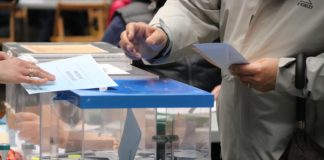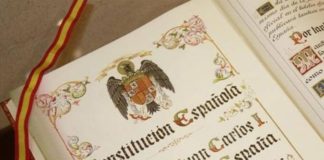JOXE ARAKAMA LOPEZ DE GEREÑU
The conquest brings the subjugation of a People by means of all kinds of violence and stunts. Conquest may be a matter of military strategy, but overall the conquerors aim at taking over the lands, cattle, property and lives of that people. The armed conquest is followed by colonization, a process whereby the mighty underpin the conquest by stripping the subjugated people of their language, culture, values and own vision of universe.
The people subjected to colonization sees how its language, culture and values fall into oblivion, as the language, culture and values of the metropolis substitute them. Schemes and devices used as baits and other means of deception involve military, religious, economic, schooling and policing agents who undertake an effective implementation of the colonizing pursuit. Since the French revolution, the colonisers have notably drawn on schooling as a means of imposing their values, take for instance P. Lorraine in Asisko Urmeneta’s work Esklabo alaiak, going that “each school shall be a colony of French language embedded in the conquered people” (page 5). The dead of war have also provided fertile grounds for this pursuit, as showed in all the municipalities across the Northern Basque Country by the memorials to the morts pour la Patrie listing the names of the youth “fighting for the freedom of France”. Nowadays, besides the TV stations and both private and public media outlets, hundreds of social organizations push towards this colonization, either inadvertently or knowingly.
Forty years ago, the Basque Country was home to a strong Basque national awareness. Despite the fact that those ‘nationalists’ were not Basque speakers, they were positive that they were not Spanish. They may have been Basque speakers or just vascos/basques, but not at all Spanish. The strength of that discourse and actions emphasized the national aspect. In fact they were not few those who were sent to prison for pitching a Basque flag in public venues. Back in those times, the Basque flag and our specific three-hole flute, the txistu, were dangerous, treasured items. It holds true that the Basque language’s status is better than back in that period. By contrast, national awareness has significantly dropped. “A healthy regionalism” is spreading in society, with our left or right leaning politicians deciding to sideline their Basque national discourse.
The results of that practice are apparent, i.e. the colonization process of the Basque Country is well advanced; the attrition of national awareness has made national discourse imperceptible. ‘Our’ political leaders have actually ruled out the national discourse in their everyday practice, often explicitly so, also projecting out that attitude to society. Our society acts Spanish or French, that is apparent in all the spheres and details of our public and private life, such as words, gestures, points of view and emotional aspects, involving both trivial and far-reaching decisions. In the Southern Basque Country, neglect of Basque language is growingly conspicuous, expressions of national demands are fewer and far between, society increasingly favours a participation in Spanish institutions, both in sport or other domains of life. Both journalists and politicians draw ever more on Spanish references in order to express an idea or just to provide an example, with our radio and TV stations acting very apparently as regional TV and radio relays. Both left and right wing movements, groups or ‘NGOs’, as well as societies falling in the category of official, semi-official or any other label, consider perfectly normal the participation in institutions based in Madrid or Paris.
Therefore, instead of setting up or invoking like-minded organizations in our own domain, we submissively accept French and Spanish organizations rejecting our language, culture and identity, such as the French and Spanish Army, National Police, Civil Guard or Gendarmerie, obviously so, but also the French and Spanish Judges Association, National French and Spanish Lawyers Guild, French and Spanish National Medical Associations, French and Spanish National Society of the Visually Impaired, French and Spanish Red Cross, French and Spanish Football, Handball, Tennis, Cycling, or Judo Association, National Society of Architects, National Association of Sport Referees, etc.
We are well aware that by participating in those entities, we clearly show a French-Spanish national identity, but it seems not to be an issue anymore. Worst of all, we re-assert our French-Spanish nationality by participating in these alien societies, including instances that involve literature, cinema, poetry, science, technology, dance, sport and others, attending Spanish or French national congresses, organizing Spanish national sports events in our towns or cities, citing their generation of revenue and wealth, etc.
On balance, our support to these initiatives substantially feeds the Spanish-French colonisation process, exposing the feeble national sentiment and low-level of national awareness among Basques. We are increasingly playing in the Spanish-French ‘regional’ league. Winners of French and Spanish national sport tournaments or professional events become praiseworthy, also celebrating the high scores earned by personalities representing Spain/France, we sponsor the training of professionals who will stand for Spain or France, etc. We thus participate in activities and rituals whose main purpose lies in the elicitation and expression of a certain national affiliation and allegiance to France/Spain, feeling no regret or criticism for that, or a divergent gesture, along the lines of regular communicative conventions set all over the world. We brandish at best the ‘regional’ flag as a token of goodwill in a gesture devoid of political implications.

![44151IMG-20170806-WA0000[1]](https://www.naziogintza.eus/wp-content/uploads/2018/02/44151IMG-20170806-WA00001-696x528.jpg)




